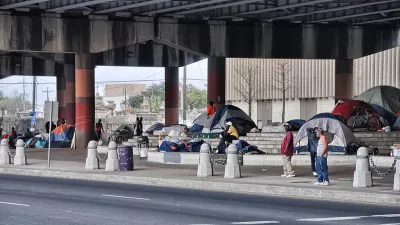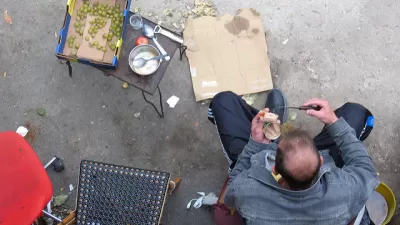Images captured on cameras mounted on a municipal vehicle are being used to train a private technology companies’ AI algorithm to detect tents and signs of habitation in vehicles.

The Guardian recently reported that San Jose is conducting what experts believe to be a first-of-its kind experiment to train AI to recognize tents and cars with people living inside them. Since last December, city employees have been driving periodically through the city’s district 10, filming footage of streets and public spaces with a camera mounted on a municipal vehicle. That footage is then fed into computer vision software and used to train algorithms for a handful of technology companies’ algorithms to detect “unwanted objects.”
“Some of the capabilities the pilot project is pursuing — such as identifying potholes and cars parked in bus lanes — are already in place in other cities. But San Jose’s foray into automated surveillance of homelessness is the first of its kind in the country, according to city officials and national housing advocates,” writes Guardian reporter Todd Feathers.
The pilot won't likely impact just San Jose, Feathers reports: "San Jose’s position as a national leader on government procurement of technology means that its experiment with surveilling encampments could influence whether and how other cities adopt similar detection systems.” It could be of particular interest to the increasing number of local governments criminalizing activities that homeless people have no choice but to undertake, as well as Florida municipalities looking to enforce that state’s new ban on outdoor sleeping.
The Guardian article digs into the finer details of how the AI algorithms are being trained to distinguish between, for example, an RV that’s simply parked and one that’s being lived in, as well as privacy issues for people’s faces and license plate numbers that are captured. Though the pilot’s data use policy says the footage can’t be used for law enforcement purposes, police can request the footage. And, in light of San Jose’s recent crackdowns on homeless encampments but already overwhelmed shelters that leave the unhoused people nowhere to go, housing advocates are concerned the technology will be used to punish the city’s unhoused residents. A city employee told the Guardian that one response to the new technology’s findings might be to send outreach workers to a single tent before it can grow into an encampment; however, the San Jose housing department and non-profits providing aid to unhoused people told the Guardian they were not involved in the pilot.
FULL STORY: Revealed: a California city is training AI to spot homeless encampments

Maui's Vacation Rental Debate Turns Ugly
Verbal attacks, misinformation campaigns and fistfights plague a high-stakes debate to convert thousands of vacation rentals into long-term housing.

Planetizen Federal Action Tracker
A weekly monitor of how Trump’s orders and actions are impacting planners and planning in America.

In Urban Planning, AI Prompting Could be the New Design Thinking
Creativity has long been key to great urban design. What if we see AI as our new creative partner?

How Trump's HUD Budget Proposal Would Harm Homelessness Response
Experts say the change to the HUD budget would make it more difficult to identify people who are homeless and connect them with services, and to prevent homelessness.

The Vast Potential of the Right-of-Way
One writer argues that the space between two building faces is the most important element of the built environment.

Florida Seniors Face Rising Homelessness Risk
High housing costs are pushing more seniors, many of them on a fixed income, into homelessness.
Urban Design for Planners 1: Software Tools
This six-course series explores essential urban design concepts using open source software and equips planners with the tools they need to participate fully in the urban design process.
Planning for Universal Design
Learn the tools for implementing Universal Design in planning regulations.
Gallatin County Department of Planning & Community Development
Heyer Gruel & Associates PA
JM Goldson LLC
City of Camden Redevelopment Agency
City of Astoria
Transportation Research & Education Center (TREC) at Portland State University
Jefferson Parish Government
Camden Redevelopment Agency
City of Claremont





























